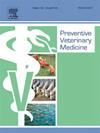评估孟加拉国rangpur省大型反刍动物养殖户关于疫苗使用的知识、态度和做法
IF 2.2
2区 农林科学
Q1 VETERINARY SCIENCES
引用次数: 0
摘要
背景疫苗是预防和控制反刍家畜疾病的关键。然而,疫苗接种运动的有效性取决于畜牧生产者对其实施的知识、观点和行为。遗憾的是,据提交人所知,孟加拉国没有开展任何研究,以评估大型反刍动物养殖户(LRF)在使用疫苗预防传染病方面的知识、态度和做法状况。因此,本研究的目的是首次解决孟加拉国的这一研究差距。方法采用横断面调查方法,对孟加拉国Rangpur地区的244名LRF进行调查。参与者是随机选择的,数据是通过面对面访谈和结构化问卷收集的。KAP水平被划分为“好”或“差”、“正”或“负”,采用评分方法,分值为60% %。分析包括描述性统计和逻辑回归模型的应用。结果调查对象以男性(85.2% %)、31-40岁(32.8% %)、高学历(27.9% %)和疫苗接种培训(28.7% %)为主。73.8% %的农民了解疫苗,但只有39.8% %的农民了解疫苗在预防感染动物疾病方面的作用,40.2% %的农民了解疫苗在减少抗生素使用方面的作用。值得注意的是,61.5% %的人意识到了负面的缺点,59.4% %的人报告给他们的反刍动物群接种了疫苗。大多数养殖户(62.7% %)不检查疫苗有效期或不妥善处理小瓶(81.6% %),对环境和公众健康造成危害。总体而言,46.3% %、55.3% %和27.8% %的农民具有良好的知识、积极的态度和良好的做法。多变量分析显示,年龄在41-50岁、中等教育程度较高、有15年以上奶牛养殖经验、接受过疫苗接种培训的男性农民更有可能对疫苗使用有良好的了解。因此,积极态度与接受过疫苗接种培训的具有研究生学位的男性农民有关。同样,受过培训的农民更有可能有良好的疫苗接种做法。结论本研究揭示了农民的KAP得分差距。必须制定有针对性的教育和培训举措,以成功解决疫苗使用方面的知识和实践差距,并预防潜在的大型反刍动物疾病。本文章由计算机程序翻译,如有差异,请以英文原文为准。
Assessment of knowledge, attitudes, and practices on vaccine usage among large ruminant farmers in the rangpur division of Bangladesh
Backgrounds
Vaccines are crucial for preventing and controlling diseases in ruminant livestock. However, the effectiveness of vaccination campaigns depends on livestock producers' knowledge, perspectives, and behaviours towards their implementation. Unfortunately, as far as the author knowledge, no studies have been conducted in Bangladesh to assess the knowledge, attitudes, and practices (KAP) status of large ruminant farmers (LRF) regarding vaccine use against infectious diseases. Therefore, the aim of the present study was to address this research gap in Bangladesh for the first time.
Methods
A cross-sectional study was conducted among 244 LRF in selected regions of Rangpur division, Bangladesh. The participants were selected at random, and data was collected via face-to-face interviews with a structured questionnaire. KAP levels were categorized as "good" or "poor" and "positive" or "negative" using a scoring method with a 60 % cut-off. The analysis comprised the utilization of descriptive statistic as well as logistic regression models.
Results
The findings demonstrated that most respondents were male (85.2 %), aged 31–40 (32.8 %), with higher education (27.9 %), and vaccination training (28.7 %). While 73.8 % of farmers knew about vaccines, only 39.8 % understood their role in preventing illness from infected animals, and 40.2 % in reducing antibiotic use. Notably, 61.5 % were aware of negative drawbacks, and 59.4 % reported vaccinating their ruminant herds. Most farmers (62.7 %) don't check the expiration dates on vaccine or properly dispose of vials (81.6 %), which poses environmental and public health hazards. Overall, 46.3 %, 55.3 %, and 27.8 % of the farmers had good knowledge, a positive attitude, and good practices, respectively. Multivariable analyses revealed that male farmers aged 41–50 with a higher secondary education, over 15 years of dairy farming experience, and vaccination training were more likely to have good knowledge of vaccine usage. Accordingly, positive attitudes were associated with male farmers with graduate degrees who had vaccination training. Similarly, trained farmers were more likely to have good vaccination practices.
Conclusions
The study reveals farmers' KAP score gaps. It is critical to develop targeted educational and training initiatives to successfully address knowledge and practice gaps regarding vaccine usage and prevent potential large ruminant diseases.
求助全文
通过发布文献求助,成功后即可免费获取论文全文。
去求助
来源期刊

Preventive veterinary medicine
农林科学-兽医学
CiteScore
5.60
自引率
7.70%
发文量
184
审稿时长
3 months
期刊介绍:
Preventive Veterinary Medicine is one of the leading international resources for scientific reports on animal health programs and preventive veterinary medicine. The journal follows the guidelines for standardizing and strengthening the reporting of biomedical research which are available from the CONSORT, MOOSE, PRISMA, REFLECT, STARD, and STROBE statements. The journal focuses on:
Epidemiology of health events relevant to domestic and wild animals;
Economic impacts of epidemic and endemic animal and zoonotic diseases;
Latest methods and approaches in veterinary epidemiology;
Disease and infection control or eradication measures;
The "One Health" concept and the relationships between veterinary medicine, human health, animal-production systems, and the environment;
Development of new techniques in surveillance systems and diagnosis;
Evaluation and control of diseases in animal populations.
 求助内容:
求助内容: 应助结果提醒方式:
应助结果提醒方式:


